
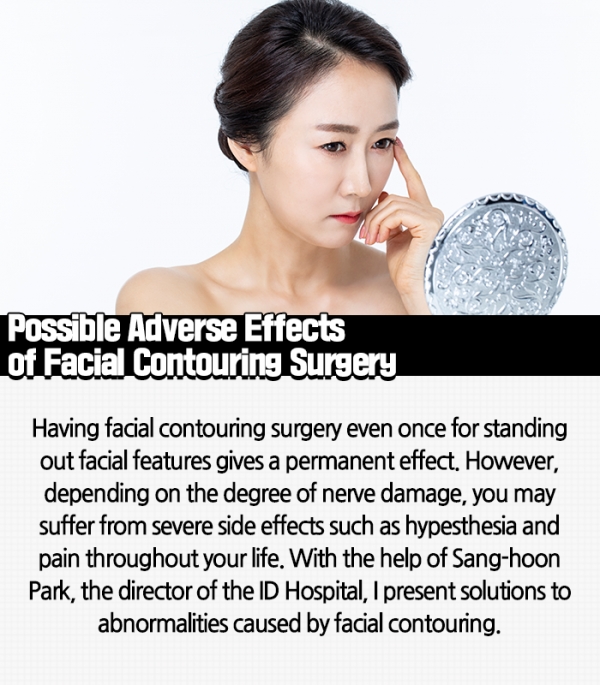
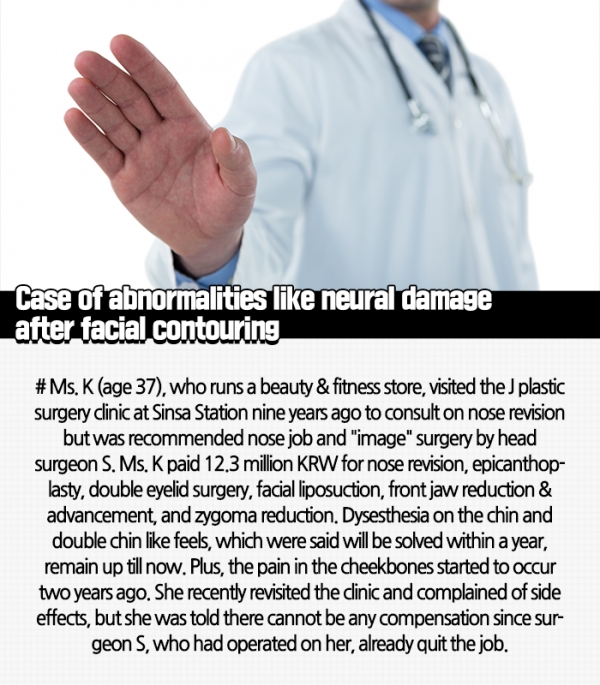
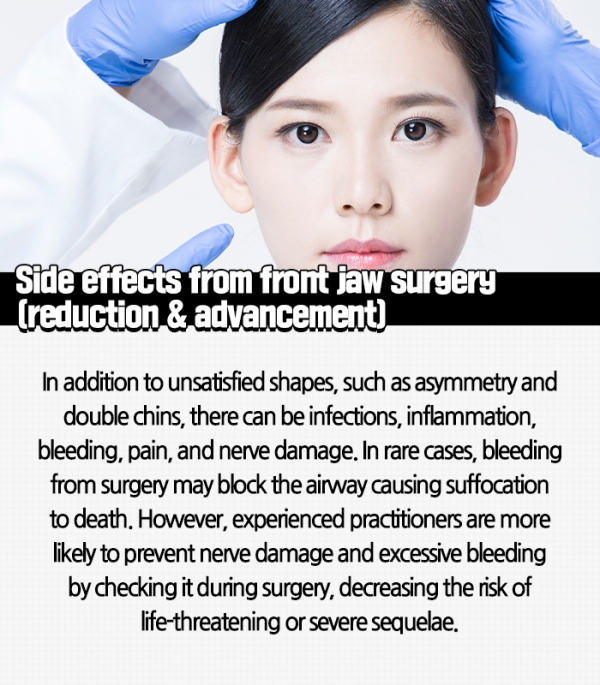

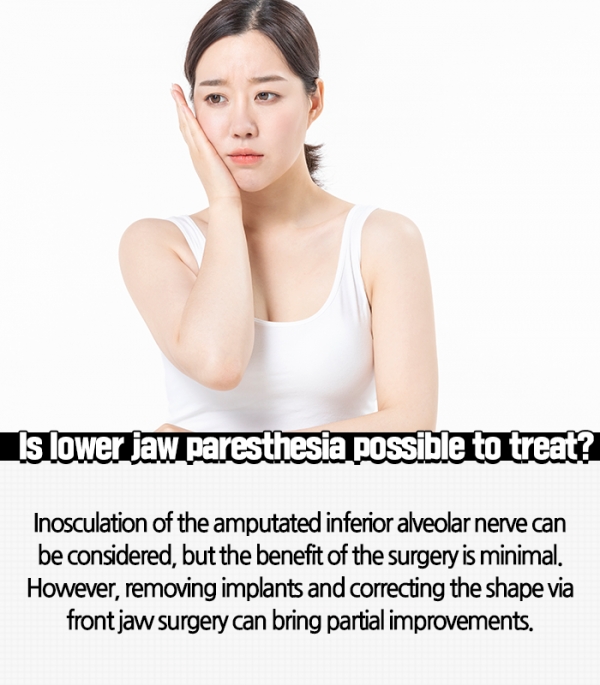
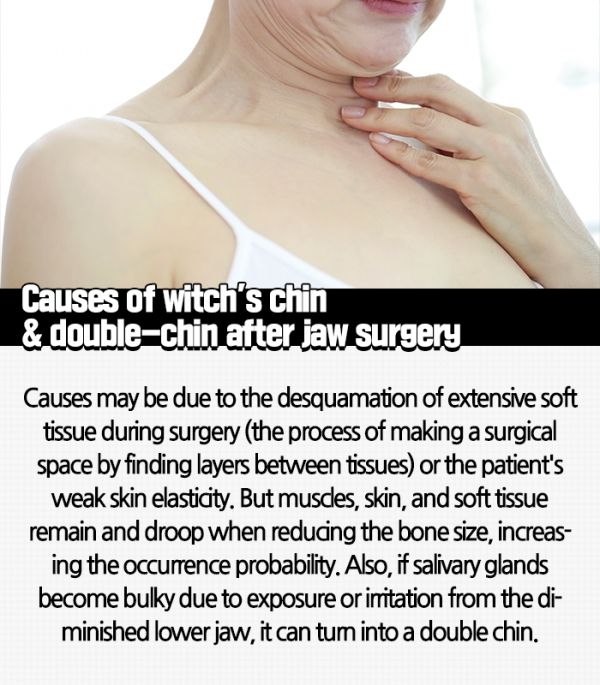




[Deep Dive into Plastic Surgery Side Effects] Abnormalities Including Neural Damage After Facial Contouring Surgery
CARD 1: Possible Adverse Effects of Facial Contouring Surgery
Having facial contouring surgery even once for standing out facial features gives a permanent effect. However, depending on the degree of nerve damage, you may suffer from severe side effects such as hypesthesia and pain throughout your life. With the help of Sang-hoon Park, the director of the ID Hospital, I present solutions to abnormalities caused by facial contouring.
CARD 2: Case of abnormalities like neural damage after facial contouring
# Ms. K (age 37), who runs a beauty & fitness store, visited the J plastic surgery clinic at Sinsa Station nine years ago to consult on nose revision but was recommended nose job and "image" surgery by head surgeon S. Ms. K paid 12.3 million KRW for nose revision, epicanthoplasty, double eyelid surgery, facial liposuction, front jaw reduction & advancement, and zygoma reduction. Dysesthesia on the chin and double chin like feels, which were said will be solved within a year, remain up till now. Plus, the pain in the cheekbones started to occur two years ago. She recently revisited the clinic and complained of side effects, but she was told there cannot be any compensation since surgeon S, who had operated on her, already quit the job.
CARD 3: Side effects from front jaw surgery (reduction & advancement)
In addition to unsatisfied shapes, such as asymmetry and double chins, there can be infections, inflammation, bleeding, pain, and nerve damage. In rare cases, bleeding from surgery may block the airway causing suffocation to death. However, experienced practitioners are more likely to prevent nerve damage and excessive bleeding by checking it during surgery, decreasing the risk of life-threatening or severe sequelae.
CARD 4: Causes of Ms. K’s abnormal sensations in the lower jaw
Based on X-rays and panoramic data, amputation of the lower jaw inferior alveolar nerve seems to be the main cause, and partially due to implants. Abnormalities due to nerves stimulated from surgery usually recover within three months, but the damage on the inferior alveolar nerve (the sensory nerves for teeth, gums, tongues, lips, etc. in the lower jaw) can last for more than six months and, if amputated, may leave lifetime paresthesia and pain. It also causes hypesthesia and numbness in the lower jaw skin, gums, and teeth area that the nerves control.
CARD 5: Is lower jaw paresthesia possible to treat?
Inosculation of the amputated inferior alveolar nerve can be considered, but the benefit of the surgery is minimal. However, removing implants and correcting the shape via front jaw surgery can bring partial improvements.
CARD 6: Causes of witch’s chin & double-chin after jaw surgery
Causes may be due to the desquamation of extensive soft tissue during surgery (the process of making a surgical space by finding layers between tissues) or the patient's weak skin elasticity. But muscles, skin, and soft tissue remain and droop when reducing the bone size, increasing the occurrence probability. Also, if salivary glands become bulky due to exposure or irritation from the diminished lower jaw, it can turn into a double chin.
CARD 7: Solution to witch’s chin & double-chin after chin tip surgery
Depending on the symptoms, methods for improvements are liposuction, lifting procedure, full facelift, and refastening the chin tip muscles. If you feel like you have a double chin due to bulky salivary glands, Botox procedures of one or two times can be helpful.
CARD 8: Pain in the cheekbone area as time passes after surgery
Cheekbone nonunion, fixed pin fractures, trigeminal neuralgia, temporomandibular joint pain, and toothache may occur. Cheekbone nonunion and pin fractures, which gradually worsen as time goes and bring pain after several years, can be treated with surgery. Other pains can be alleviated by nerve pain relievers and dental treatment.
CARD 9: Advice from Sang Hoon Park, the director (head surgeon) of the ID Hospital
“If you have decided to have plastic surgery, it’s a good idea to set goals best for you and be aware of the side effects that might follow and treatment methods beforehand. Besides, since rashly proceeding a surgery of moving the bones like facial contouring may bring severe side effects, you must thoroughly consult with a specialist before making a decision.”
CARD 10: Tips for agreement or medical malpractice suit
Attorney Lee Seon Ho of Yeon Woo Legal Professional Assoc. said, “You can request an agreement or medical malpractice suit against the head director or other co-representative, who were in charge back then. To proceed lawsuit, you need to file within 10 years of the accident, and the burden of proof is on the assailant."
Reporter Ji-sun Sim


